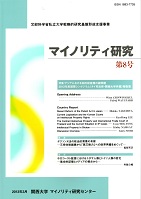(2) Researchers’ Activities
Academic Report about the “Development of Dialect Policy in the Three
Baltic Countries”
The 2010 academic conference on Japanese Comparative Politics Studies in the branch of “Comparative Politics Studies of Dialect Policy” was reported in the meeting on 19 – 20 June at Tokyo University of Foreign Studies. Before getting to the point on how my report relates to the minority research; we will start with introduction about structure of the branch. The structure is divided into three parts; the first report presented by Professor Kasunari SAKAI from Kobe University was “Policy for Protection of Dialect in the EU - Since the East Expansion”. The second report by Professor Hiromi KOMORI from Kyoto University was about “Dialect Development Policy in the Three Baltic Countries”. The third lecture by Professor Satoru MATSUDA from Kyoto Gakuen University was “Policy on Dialect and Conflict between ethnic groups – an example from Sri Lanka” which had been presented by discussion with Professor Naoki IMABAYASHI from Miyagi Gakuin Women’s University, the meeting conductor and debater.
There are many cases in Japan which practice of policy on dialect directly or indirectly results in separation or integration of the state and a region. Notwithstanding the significance of the problem, there are a considerable number of sociological researches and Sociolinguistics researches, whereas, research on specific examples indicates that in the field of politics study; especially, the comparative politics study has rarely taken dialect policy into consideration. Therefore, this problem is the background for this research which aims for finding the possibility of comparative dialect politics study.
Dialect policy can be roughly divided into two; that is, the policy about national language, and the policy for protection of minority dialects. EU has been veiewed as the advanced in the field of protection of minority dialects; however, institutionalization of the protection requires many works that even its ideology is shared, agreement on practice of the policy is not easy to be reached, let alone the case of the three Baltic countries which were separated from the USSR because of the fear that their own national languages would be extinct. In these countries, it is hard to gain understanding, not only in the citizen level but also in the politicians’ level. In addition, according to the fact that in these small countries, their own national language usage is a small portion comparing to the Russian-language usage; therefore, the protection out there is for the Russian- language speaking majority.
In reality, the problem in these Three Baltic Countries is not protection of minority dialects. Minority in these countries has enjoyed the protection beyond expectation since the USSR period. The problem is its compromising reduction and transition to European minority dialect rights; on top of that, there is a problem about relationship between the right of minority to their languages and social integration. The problem of these three Baltic countries is not only exclusion from society due to national language inability, but also how failure in the social connotation, which persists despite the fact that the national language is learned, would be attained.
Researcher:Assistant Professor Hiromi KOMORI (from Kyoto University, Center for Integrated Area Studies)



